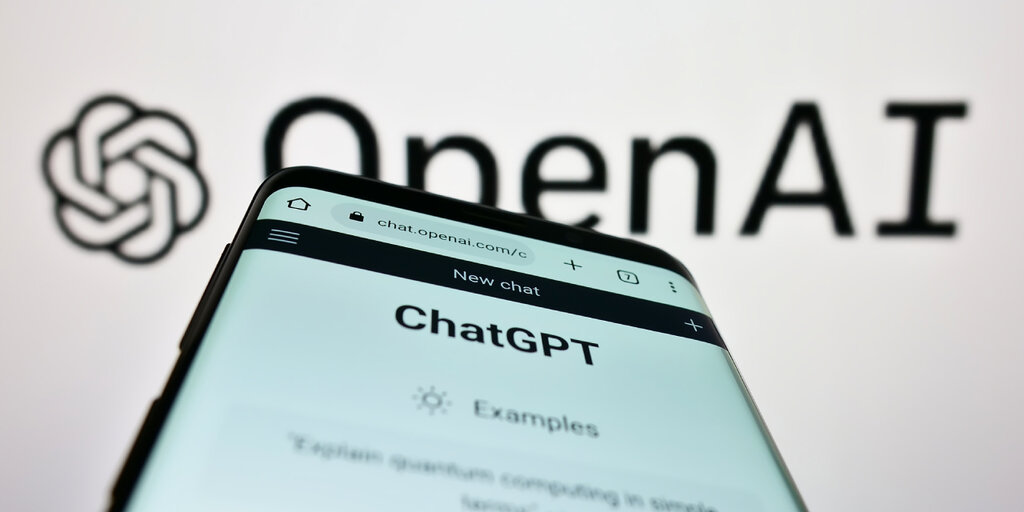When conversing with a chatbot, there are things you probably wished it would remember, and things you wished it would forget. ChatGPT creator OpenAI has you covered, announcing a new feature that gives the popular class=”sc-adb616fe-0 iLQIVg” href=”https://decrypt.co/resources/what-is-generative-ai-the-technology-that-can-teach-itself” target=”_blank” rel=”noopener”>generative AI tool the ability to “remember” information for future conversations.
“We’re testing the ability for ChatGPT to remember things you discuss to make future chats more helpful,” OpenAI said in a class=”sc-adb616fe-0 iLQIVg” href=”https://openai.com/blog/memory-and-new-controls-for-chatgpt” target=”_blank” rel=”noopener nofollow external”>blog post on Tuesday. “You’re in control of ChatGPT’s memory.”
The new memory feature, OpenAI said, will roll out to select ChatGPT free and Plus subscribers this week as a test, with a broader rollout coming at an undisclosed time.
The memory feature is OpenAI’s latest attempt to create a personalized AI experience. Last summer, the ChatGPT developer introduced “ class=”sc-adb616fe-0 iLQIVg” href=”https://decrypt.co/149429/you-can-now-customize-ai-chatbot-chatgpt-act-way-you-want” target=”_blank” rel=”noopener”>custom instructions” that let users tailor the responses they receive from the chatbot.
According to OpenAI, users looking to take advantage of the memory feature can turn it on in account settings under personalization. OpenAI said users can tell ChatGPT to forget what’s in memory or even delete specific memories.
“You can explicitly tell it to remember something, ask it what it remembers, and tell it to forget conversationally or through settings,” an OpenAI spokesperson told Decrypt in an email. “You can also turn it off entirely. We are also introducing ‘temporary chats’ for the times you’d like to have a conversation without using memory.”
Custom GPT applications will also be able to use the new memory feature with OpenAI, allowing developers to turn on the feature for users. OpenAI says users’ memories will not be shared with developers.
While GPT builders will not have access to memories, OpenAI noted the company may use content provided to ChatGPT, including memories, to improve its models—but said users can turn this off in settings.
“Memory brings additional privacy and safety considerations, such as what type of information should be remembered and how it’s used,” OpenAI said. “We’re taking steps to assess and mitigate biases and steer ChatGPT away from proactively remembering sensitive information, like your health details—unless you explicitly ask it to.”
OpenAI has invested heavily in beefing up ChatGPT’s privacy features to address regulators’ and privacy advocates concerns. In April, OpenAI added the ability to class=”sc-adb616fe-0 iLQIVg” href=”https://decrypt.co/137934/openai-boosts-privacy-with-ability-to-delete-chat-history” target=”_blank” rel=”noopener”>delete chat history and remove user prompts from the company’s trading models after several countries banned the tool.
Despite class=”sc-adb616fe-0 iLQIVg” href=”https://decrypt.co/146283/congressional-staff-can-only-use-paid-chatgpt-accounts-protect-privacy” target=”_blank” rel=”noopener”>privacy concerns and claims of racism, class=”sc-adb616fe-0 iLQIVg” href=”https://decrypt.co/151796/ai-political-bias-left-right-research” target=”_blank” rel=”noopener”>bias, and class=”sc-adb616fe-0 iLQIVg” href=”https://decrypt.co/212077/not-telling-the-full-story-openai-challenges-nyts-copyright-lawsuit-claims” target=”_blank” rel=”noopener”>copyright infringement, OpenAI CEO Sam Altman is planning a new funding round in which the company is reportedly seeking a historic class=”sc-adb616fe-0 iLQIVg” href=”https://decrypt.co/216731/openai-considers-7-trillion-round-thinks-it-can-double-revenue-by-2025-reports” target=”_blank” rel=”noopener”>$7 trillion valuation.
Edited by class=”sc-adb616fe-0 iLQIVg” href=”https://decrypt.co/author/ryanozawa” target=”_blank” rel=”noopener”>Ryan Ozawa.
Stay on top of crypto news, get daily updates in your inbox.
Source link
Disclaimer
We strive to uphold the highest ethical standards in all of our reporting and coverage. We StartupNews.fyi want to be transparent with our readers about any potential conflicts of interest that may arise in our work. It’s possible that some of the investors we feature may have connections to other businesses, including competitors or companies we write about. However, we want to assure our readers that this will not have any impact on the integrity or impartiality of our reporting. We are committed to delivering accurate, unbiased news and information to our audience, and we will continue to uphold our ethics and principles in all of our work. Thank you for your trust and support.
Editorial TeamStartupNews.fyi is a leading global startup and technology media platform known for its end-to-end coverage of the startup ecosystem across India and key international markets. Launched with the vision of becoming a single gateway for founders, investors, and ecosystem enablers, StartupNews.fyi has grown steadily over the years by publishing tens of thousands of verified news stories, insights, and ecosystem updates, reaching millions of startup enthusiasts every month through its digital platforms and communities.



![[CITYPNG.COM]White Google Play PlayStore Logo – 1500×1500](https://startupnews.fyi/wp-content/uploads/2025/08/CITYPNG.COMWhite-Google-Play-PlayStore-Logo-1500x1500-1-630x630.png)